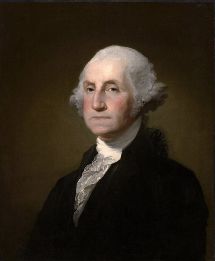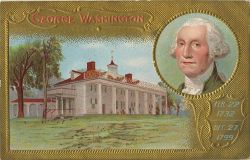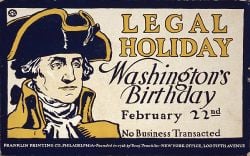Washington's Birthday
- "Presidents' Day" redirects here.
- "Lincoln's Birthday" redirects here.
| Washington's Birthday | |
|---|---|

| |
| George Washington by Gilbert Stuart (1797) | |
| Official name | Washington's Birthday |
| Also called | Presidents Day or a variant thereof |
| Observed by | United States |
| Type | Federal (and most U.S. states) |
| Observances | Community, historical celebrations; Congressional recognition. |
| Related to | Lincoln's Birthday |
Washington's Birthday is a United States federal holiday celebrated on the third Monday of February in honor of George Washington, the first President of the United States, who was born on February 22, 1732 (by the Gregorian calendar). Since the Uniform Federal Holidays Act of 1971, its observance can occur from February 15 to 21, inclusive.
Colloquially, the day is also now widely known as Presidents' Day and is often an occasion to honor all who have served as president, not just George Washington. In particular, Abraham Lincoln, whose birthday is February 12, is often honored together with Washington. Celebrations involve honoring Washington as the founding president in ways both serious, such as reading his Farewell Address, to the more frivolous, such as eating cherry pie. The long weekend has become an opportunity for shopping for deals as most businesses remain open, often offering sales and other promotions.
History
Washington's birthday
George Washington was born on February 11, 1731 (by the Julian calendar), at his parents' Pope's Creek Estate near Colonial Beach in Westmoreland County, Virginia. At the time, the entire British Empire, including its North American possessions, was on the Julian calendar; the Empire, not being bound to the Catholic Church, had not yet adopted the modern Gregorian calendar that Catholic countries adopted in 1582. Consequently, due to leap year differences, by the 1730s the Julian calendar used by Britain and the Colonies was eleven days behind the Gregorian. Furthermore, the British civil year began on March 25 rather than January 1, so that dates in February 'belonged' to the preceding year. In 1752, The British Empire switched to the Gregorian calendar; since then, Americans born prior to 1752, including Washington, have typically had their birthdays recognized under what their birthday would have been under the Gregorian calendar. Since, during the 1700s, February 11 under the Julian calendar would fall as February 22 on the Gregorian, Washington's birthday has been generally recognized as February 22, 1732.
The federal holiday honoring Washington was originally implemented by an Act of Congress in 1879 for government offices in Washington (20 Stat. 277) and expanded in 1885 to include all federal offices (23 Stat. 516). The first federal holiday to honor an American president, the holiday was celebrated on Washington's birthday, February 22. On January 1, 1971, the federal holiday was shifted to the third Monday in February by the Uniform Monday Holiday Act.[1] This places it between February 15 and 21, which makes "Washington's Birthday" something of a misnomer, since it never occurs on Washington's actual birthday, February 22.
An early draft of the Uniform Monday Holiday Act would have renamed the holiday "Presidents' Day" to honor the birthdays of both Washington and Lincoln, which would explain why the chosen date falls between the two, but this proposal failed in committee, and the bill was voted on and signed into law keeping the name "Washington's Birthday."[2]
A previous attempt to create a Presidents Day had occurred in 1951 when the "President's Day National Committee" was formed by Harold Stonebridge Fischer of Compton, California, who became its National Executive Director for the next two decades. The purpose was not to honor any particular president but to honor the office of the presidency. It was first thought that March 4, the original inauguration day, should be deemed Presidents Day, but the bill recognizing March 4 stalled in the Senate Judiciary Committee (which had authority over federal holidays). The committee felt that, given its proximity to Lincoln's and Washington's Birthdays, three holidays so close together would be unduly burdensome. But meanwhile the governors of a majority of the states issued proclamations declaring March 4 Presidents' Day in their respective jurisdictions.[3]
By the mid-1980s, with a push from advertisers, the term "Presidents' Day" began its public appearance.[4]
Lincoln's birthday
Lincoln's Birthday is a legal, public holiday in some U.S. states, observed on the anniversary of Abraham Lincoln's birth on February 12, 1809. Connecticut, Illinois,[5] Indiana,[6] Ohio, Texas, California, Missouri, and New York observe the holiday on this day.
In other states, Lincoln's birthday is not celebrated separately, as a stand-alone holiday. Instead Lincoln's Birthday is combined with a celebration of President George Washington's birthday and celebrated either as Washington's Birthday or as Presidents' Day on the third Monday in February, concurrent with the federal holiday.
The earliest known observance of Lincoln's birthday occurred in Buffalo, New York, in either 1873 or 1874. Julius Francis (d. 1881), a Buffalo druggist, made it his life's mission to honor the slain president. He repeatedly petitioned Congress to establish Lincoln's birthday as a legal holiday.[7]
The day is marked by traditional wreath-laying ceremonies at Abraham Lincoln Birthplace National Historic Site in Hodgenville, Kentucky, and at the Lincoln Memorial in Washington, D.C. The latter has been the site of a ceremony ever since the Memorial was dedicated. Since that event in 1922, observances continue to be organized by the Lincoln Birthday National Commemorative Committee and by the Military Order of the Loyal Legion of the United States (MOLLUS). A wreath is laid on behalf of the President of the United States, a custom also carried out at the grave sites of all deceased U.S. presidents on their birthdays. Lincoln's tomb is in Springfield, Illinois.
On February 12, 2009, the annual wreath-laying ceremony at the Lincoln Memorial commemorated Lincoln's 200th birthday in grand fashion. An extended ceremony, organized by the Abraham Lincoln Bicentennial Commission (ALBC) and with help from MOLLUS, featured musical performances from four-time Grammy-nominated singer Michael Feinstein and the U.S. Marine Corps Band. The morning celebration also featured remarks by Illinois Senator Dick Durbin; Lincoln scholar and ALBC Co-Chair Harold Holzer; recently retired Rhode Island Supreme Court Chief Justice – and ALBC Commissioner – Frank J. Williams; and author Nikki Giovanni reciting her newest work, which was written especially for the bicentennial.
As part of Lincoln's birthday bicentennial, the U.S. Mint released four new Lincoln cents. The commemorative coins have new designs on the reverse showing stages of his life. The first went into circulation on September 12, 2009. The standard portrait of Lincoln's head remains on the front. The new designs include a log cabin representing his birthplace, Lincoln as a young man reading while sitting on a log that he was taking a break from splitting, Lincoln as a state legislator in front of the Illinois Capitol, and the partially built dome of the U.S. Capitol.[8]
Official state holidays

The day is a state holiday in most states, with official names including Washington's Birthday, Presidents' Day, President's Day, and Washington's and Lincoln's Birthday. Depending upon the specific law, the state holiday might officially celebrate George Washington alone, Washington and Abraham Lincoln, or some other combination of U.S. presidents (such as Washington and the third president Thomas Jefferson, who was born in April).[9]
Although Lincoln's Birthday, February 12, was never a federal holiday, nearly half of the state governments have officially renamed their Washington's Birthday observances as "Presidents' Day," "Washington and Lincoln Day," or other such designations.
Because "Presidents' Day" is not the official name of the federal holiday there is variation in how it is rendered ("President's Day," "Presidents' Day," and "Presidents Day"), both colloquially and in the name of official state holidays.[10]
Several states honor presidents with official state holidays that do not fall on the third Monday of February. For example, in Massachusetts, the state officially celebrates "Washington's Birthday" on the same day as the federal holiday while state law also directs the governor to issue an annual "Presidents Day" proclamation on May 29 (John F. Kennedy's birthday), honoring the presidents with Massachusetts roots: Kennedy, John Adams, John Quincy Adams, and Calvin Coolidge.[11] In California, Connecticut, Missouri, and Illinois, while Washington's Birthday is a federal holiday, Abraham Lincoln's birthday is still a state holiday, falling on February 12 regardless of the day of the week.
Observance and traditions
A food traditionally associated with the holiday is cherry pie, based on the legendary chopping down of a cherry tree in Washington's youth.[12]
Until the late 1980s, corporate businesses generally closed on this day, similar to present corporate practices on Memorial Day or Christmas Day. However, after having been moved to the third Monday, most businesses remain open with many offering "Presidents Day" sales and other promotions over the long weekend. Federal and state government services close (U.S. Postal Service, state Departments of Motor Vehicles, federal and state courts).[13] Class schedules at universities and colleges vary depending on the school. Public elementary and secondary schools are generally closed, unless they use the to make up for time lost due to inclement weather.

Community celebrations often display a lengthy heritage. In Washington's adopted hometown of Alexandria, Virginia, celebrations are held throughout the month of February, including what is claimed to be the nation's longest-running and largest George Washington Birthday parade.[14] Eustis, Florida continues its annual "GeorgeFest" celebration begun in 1902.[15] At the George Washington Birthplace National Monument in Westmoreland County, Virginia, visitors are treated to birthday celebrations on the holiday.[16] At Mount Vernon, the celebrations include a wreath-laying at Washington's tomb.[17]
Since 1862 there has been a tradition in the United States Senate that George Washington's Farewell Address be read on his birthday. This tradition began on February 22, 1862, as a morale-boosting gesture during the darkest days of the Civil War.[18]
Notes
- ↑ Uniform Monday Holiday Act National Archives and Records Administration, January 15, 1968. Retrieved February 7, 2020.
- ↑ David Wells, Happy Washington and Lincoln Day FOX13, February 17, 2014. Retrieved February 7, 2020.
- ↑ Will Moneymaker, The History of Presidents’ Day Ancestral Findings. Retrieved February 7, 2020.
- ↑ C.L. Arbelbide, By George, It Is Washington's Birthday! Prologue Magazine 36(4) (Winter 2004). Retrieved February 7, 2020.
- ↑ Sec. 24-2. Holidays 105 ILCS 5/24-2. Retrieved February 7, 2020.
- ↑ Chapter 9. Legal Holidays Indiana Code 2019. Retrieved February 7, 2020.
- ↑ Louise Continelli, Lincoln Tribute Places Spotlight on Local Connection The Buffalo News, February 17, 2003. Retrieved February 7, 2020.
- ↑ "New Lincoln Pennies Unveiled: See Pictures Of Each Penny The Huffington Post, December 6, 2017. Retrieved February 7, 2020.
- ↑ Valerie Strauss, Why Presidents' Day Is slightly strange The Washington Post, February 16, 2014. Retrieved February 7, 2020.
- ↑ Hendrik Hertzberg, Too Many Chiefs The New Yorker, February 19, 2007. Retrieved February 7, 2020.
- ↑ Section 15VV Presidents Day Commonwealth of Massachusetts. Retrieved February 7, 2020.
- ↑ Jasper J. Mirabile, Jr., Celebrate George Washington's birthday with cherry pie The Kansas City Star, February 16, 2014. Retrieved February 7, 2020.
- ↑ Ashley May, What is open and closed on Presidents Day? USA Today, February 19, 2018. Retrieved February 7, 2020.
- ↑ Alexandria Celebrates Washington's Birthday VisitAlexandriaVA.com. Retrieved February 7, 2020.
- ↑ GeorgeFest Retrieved February 7, 2020.
- ↑ Celebrate Washington’s 288th and Park’s 90th Birthdays National Park Service. Retrieved February 7, 2020.
- ↑ Washington's Birthday Celebration Mount Vernon. Retrieved February 7, 2020.
- ↑ Washington's Farewell Address United States Senate. Retrieved February 7, 2020.
ReferencesISBN links support NWE through referral fees
- Myers, Robert J. Celebrations: The Complete Book of American Holidays. Doubleday & Company, 1972. ISBN 978-0385076777
- Santino, Jack. All Around the Year: Holidays and Celebrations in American Life. University of Illinois Press, 1994. ISBN 978-0252020490
- St. Nicholas Magazine. Our American Holidays: Their Meaning and Spirit. Better Days Books, 2008. ISBN 978-1435731400
External links
All links retrieved May 3, 2023.
- Presidents' Day History, Folklore, and more The Old Farmer's Almanac
- Presidents Day History.com
- Presidents Day National Today
- What Is Presidents Day? Snopes.com
- George Washington's Birthday National Archives
- "Presidents' Day"? The Truth Behind the Holiday George Washington's Mount Vernon
- Hannibal Hamlin Proposes Lincoln's Birthday a National Day of Observance 1887 Shapell Manuscript Foundation
- Abraham Lincoln Birthplace National Historic Site
| |||||
| |||||||
Credits
New World Encyclopedia writers and editors rewrote and completed the Wikipedia article in accordance with New World Encyclopedia standards. This article abides by terms of the Creative Commons CC-by-sa 3.0 License (CC-by-sa), which may be used and disseminated with proper attribution. Credit is due under the terms of this license that can reference both the New World Encyclopedia contributors and the selfless volunteer contributors of the Wikimedia Foundation. To cite this article click here for a list of acceptable citing formats.The history of earlier contributions by wikipedians is accessible to researchers here:
The history of this article since it was imported to New World Encyclopedia:
Note: Some restrictions may apply to use of individual images which are separately licensed.





